Genre: Sports Developer: Novotrade Publisher: Sega Enterprises Players: 1-2 Released: 1991
In today’s “extreme” environment, something like California Games seems somewhat tame. Anything with roller skates or tires must include a high risk of physical injury to be considered watchable, and too often there doesn’t seem to be as much interest in the actual skill involved with such events. Imagine then, how a modern audience would respond to California Games‘ footbag competition!
Sadly, it wasn’t always so. Released in 1987 for multiple computer formats as well as consoles, California Games was the next installment in Epyx’s popular Games series (behind the Summer and Winter editions) and offered a more laid back and mellow ensemble of games for armchair athletes to enjoy. Today we might construe it to be among the beginnings of the “extreme” genre, but back in ’87, it was just some good fun with sports the average person practiced in their backyards and neighborhoods.
That’s probably what’s most attractive about the whole competition. There was no need for professional emulation for the most part. Sure, only someone who really knew what they were doing would attempt to run a half pipe or do somersaults on a dirt bike, but the average person did ride skateboards and roller skate, and most did own a Huffy bike. So while the experience and skill might not be there, there wasn’t this larger-than-life, millionaire athlete aura about the whole thing like we see in other “professional” sports like baseball and basketball.
The whole California vibe echoes throughout this release. Relaxed and natural, there’s no sense of urgency to any of the events at all. In fact, should one play this port in isolation, there’s no reason not to consider it a great way to kick back and spend an afternoon. The presentation is extremely well done, with both the visuals and audio combining for a smooth and tranquil experience (I still love the surfing theme the most). The gameplay, barring a glaring lack of initial explanation for the newcomer, isn’t that hard to grasp, and while players won’t be racking up points from the get-go, the whole package can be considered pretty “pick-up-and-play” overall.
But that’s if we take this version of California Games and weigh it on its own merits. In such a vacuum, one wouldn’t need to note that what appears to be a simple experience is actually one that’s been stripped down. In truth, the Genesis port lacks more than a few things, and it isn’t even as complete as the Master System version, which, by all rights, it should easily eclipse. When one measures it against its siblings, what could have been the defining version turns out to be little more than a gimped attempt at a cash run.
As I mentioned earlier, the presentation is top notch, as one would expect from the 16-bit rendition. However, this window dressing cannot hide the fact that there are missing elements from this port. Where, for example, are the corporate sponsors? I can’t be asked to compete without the backing of Ocean Pacific or Kawasaki, now can I? I’m not entirely certain why the sponsors were eliminated, and the first reason that comes to mind is that perhaps Sega wasn’t interested in paying for the licenses. Whatever the reason, things just seem a bit more generic without them.
The Genesis version also lacks the frisbee event. Yes, the 16-bit rendition actually has fewer events than its 8-bit counterpart. While I’m not especially fond of frisbee tossing, less is never better, especially in this case. California Games is not especially deep in the sense that it doesn’t offer a ton of games or options to keep players occupied. Instead, its strength lies in the sheer playability and enjoyment that its few events offer. By reducing the overall amount of events included, Sega has only hurt what makes the game so good to begin with.
I also find that the control is much better on the Master System. Perhaps it’s a personal preference, but things should be a bit more fluid with the Genesis D-pad. Thankfully, the game is still extremely playable (no pun intended). It still shines in multi-player, and up to nine people can compete in each event. The fun to be had watching more than a half dozen of one’s friends or family fail miserably at the footbag or simply sail right off the screen in surfing is sure to last hours!
There’s not really much else to say about California Games that hasn’t already been mentioned about the multiple other versions out there. Despite not being as good as many of them, the Genesis edition is still worth playing, especially since it can be had for so little money. I sometimes wish the sequel had been given a chance on Sega’s black box, but after thinking about what happened to this version, perhaps one trip to California is more than enough.
SCORE: 6 out of 10


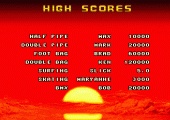
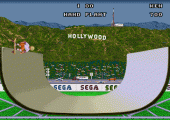
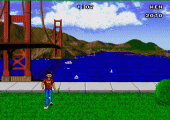
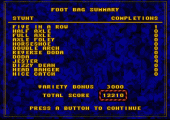
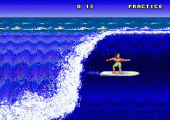
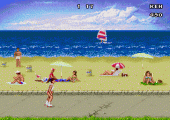
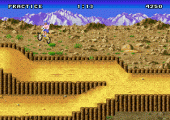
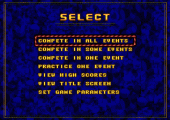
Recent Comments